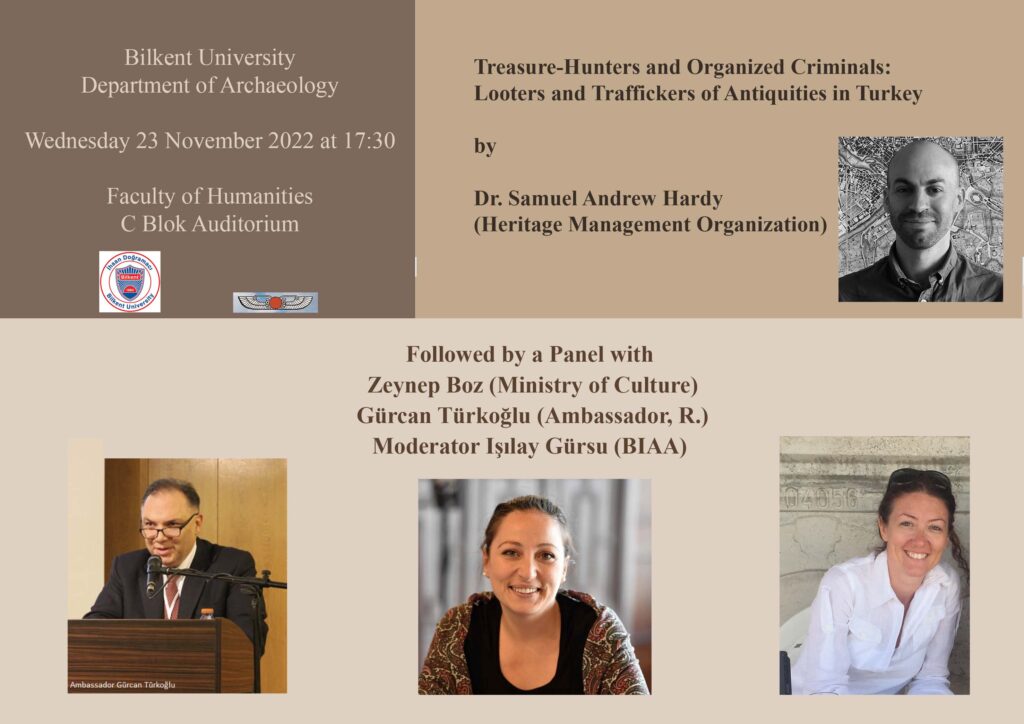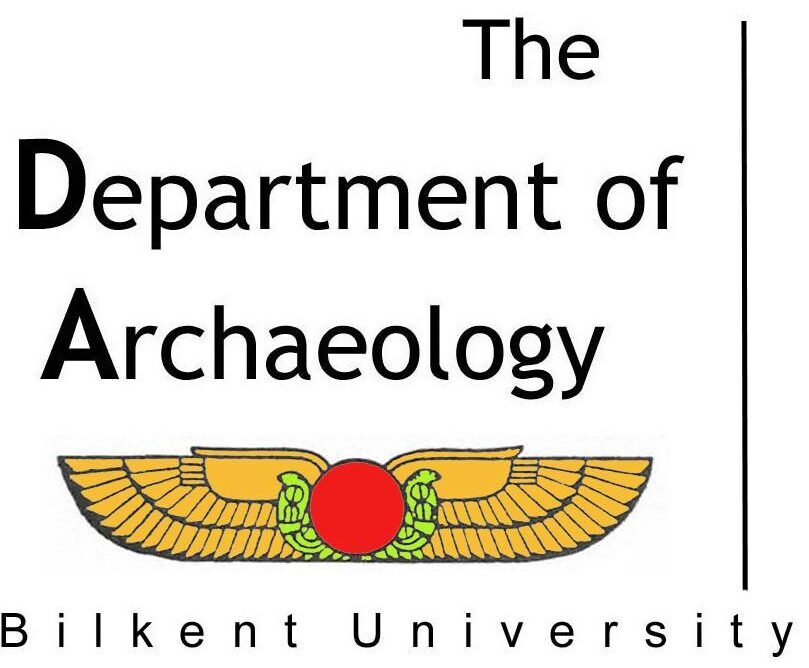2026
29th January
Julian Bennett Memorial Lecture – Reframing a City on the Roman Eastern Frontier: Recent Work at Zeugma
Time and venue: 17:30; C block amphi
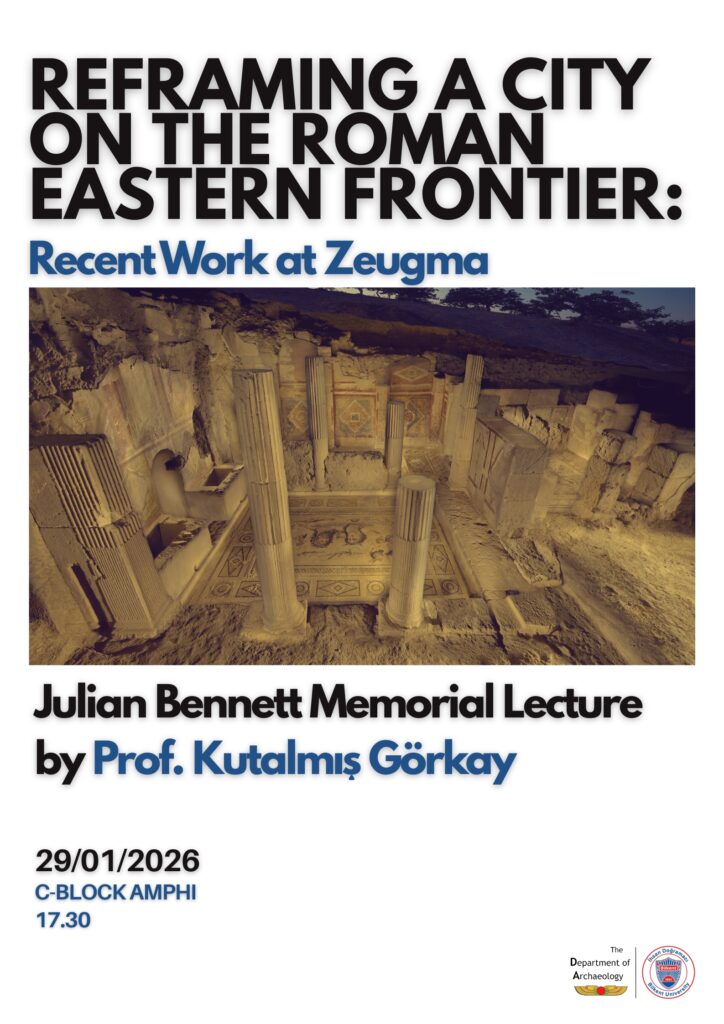
More info about the event can be found here
2025
18th December
Reading Kadyanda: Epigraphic Interpretation in Dialogue with Archaeology
Time and venue: 17:30; FFB-05
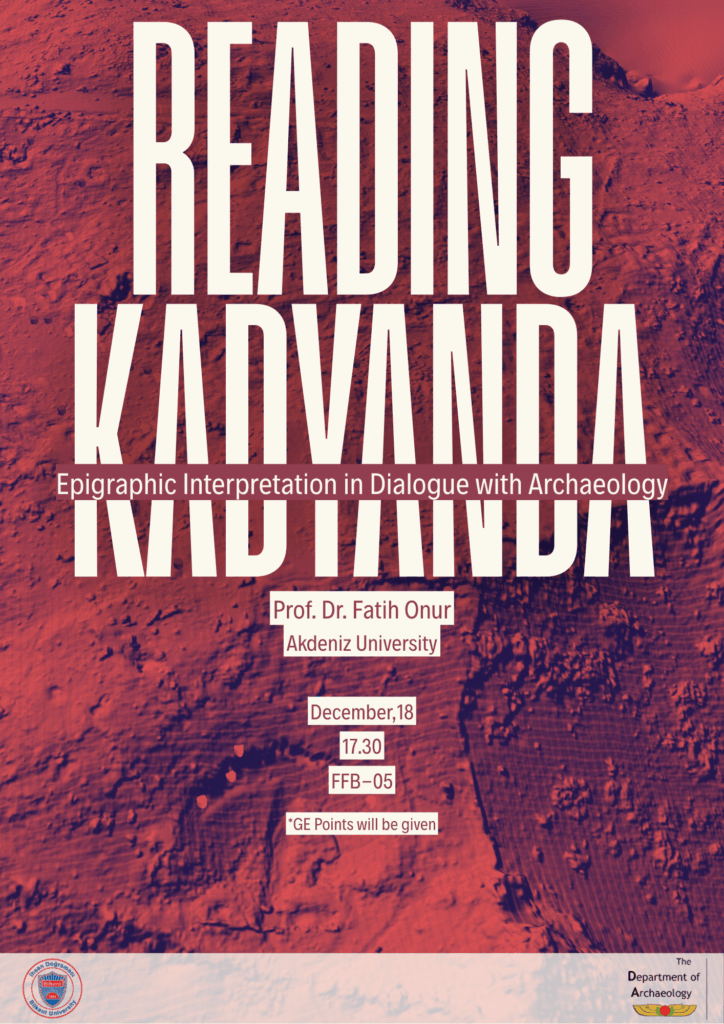
More info about the event can be found here
17th December
What does Archaeology tell us about the Crusades? Bilkent University excavations at Kinet Höyük, Dörtyol, Hatay
Time and venue: 16:30; C-Block Amphi
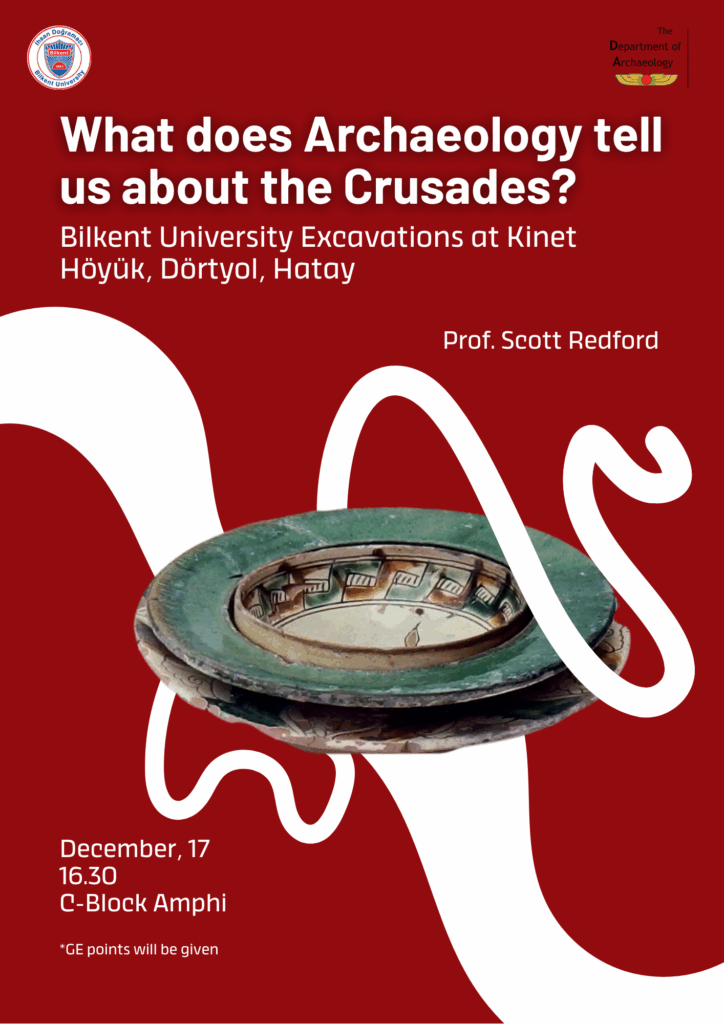
More info about the event can be found here
10th December
Monumentality: From Real Constructions to their Cultural Understanding
Time and venue: 17:30; FFB-05
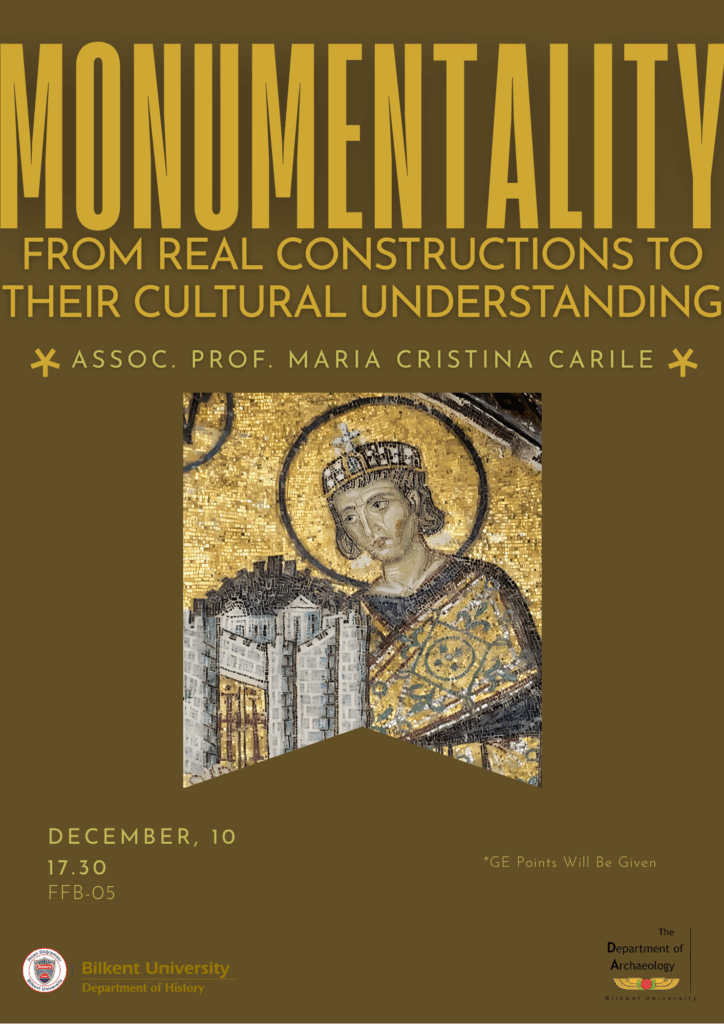
More info about the event can be found here
6th-8th November
Circumnavigating the Black Sea, Prospecting its Hinterland: Projects, Ideas and Interactions
Time and venue: 09:30-17:00; FFB-05
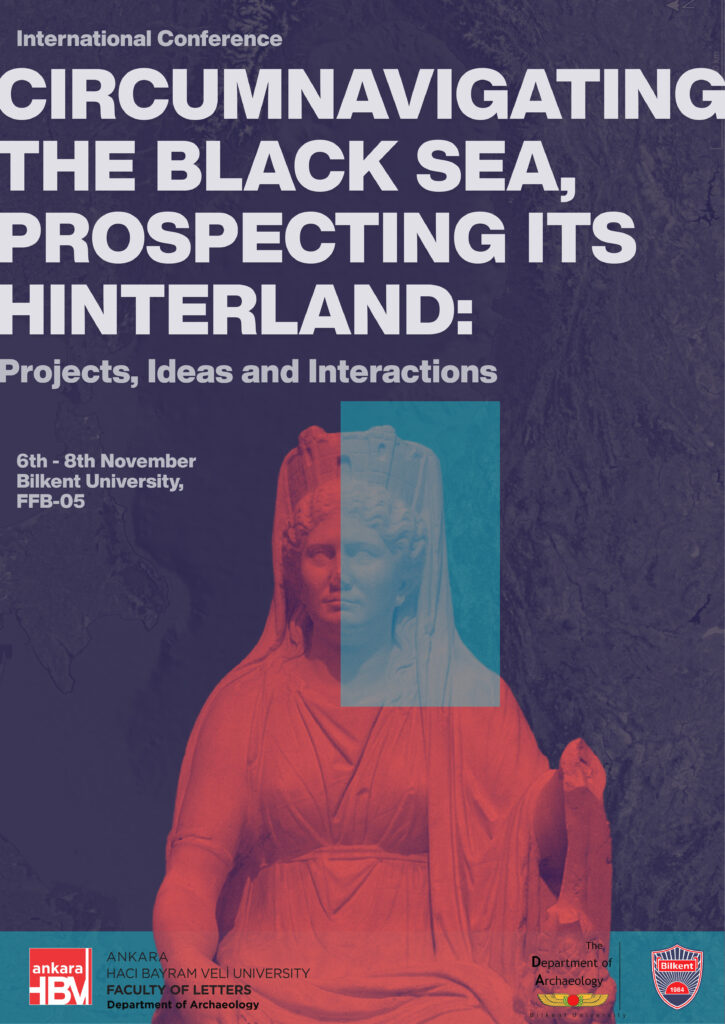
More info about the event can be found here
5th November
A Partnership of Unequals: Historicising Labour Relations between Local and Foreign Archaeologists in Türkiye through Ottoman Comparanda. Part II – Theodore Macridy: The Ottoman Archaeologist Who Worked for the King of Prussia
Time and venue: 17:30; H-232
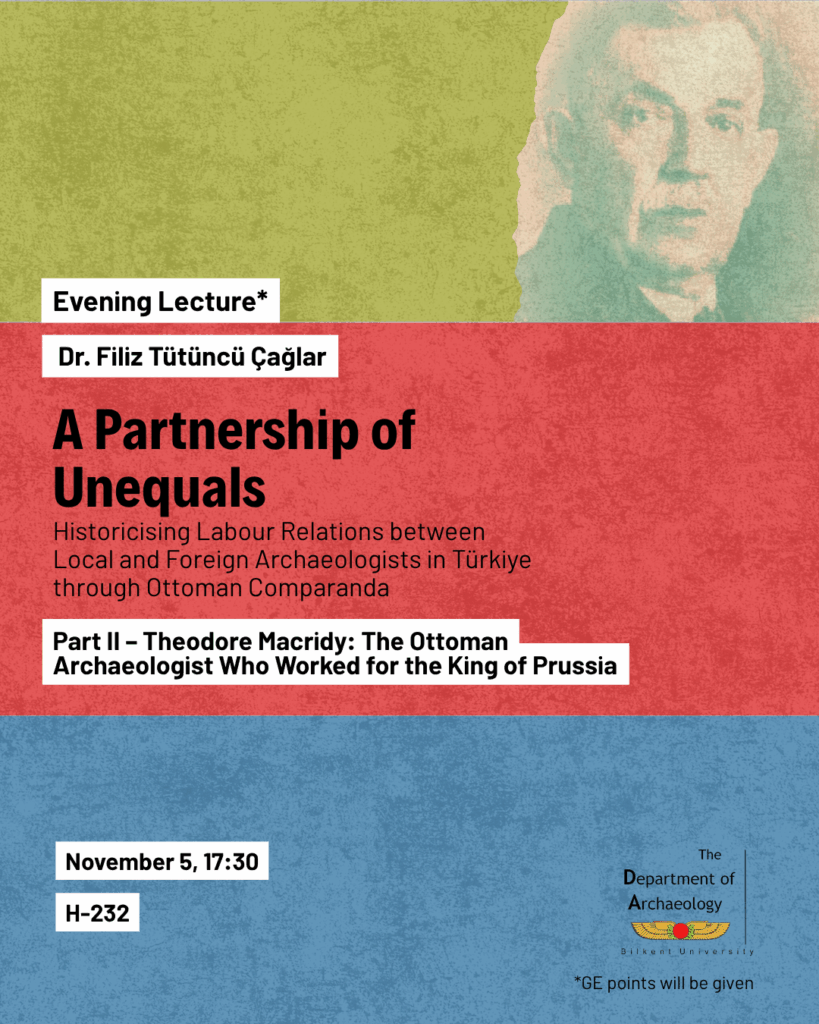
More info about the event can be found here
15th October
A Partnership of Unequals: Historicising Labour Relations between Local and Foreign Archaeologists in Türkiye through Ottoman Comparanda. Part I – Invisible Labour and the Double “Shift”
Time and venue: 17:30; C Blok Amfi
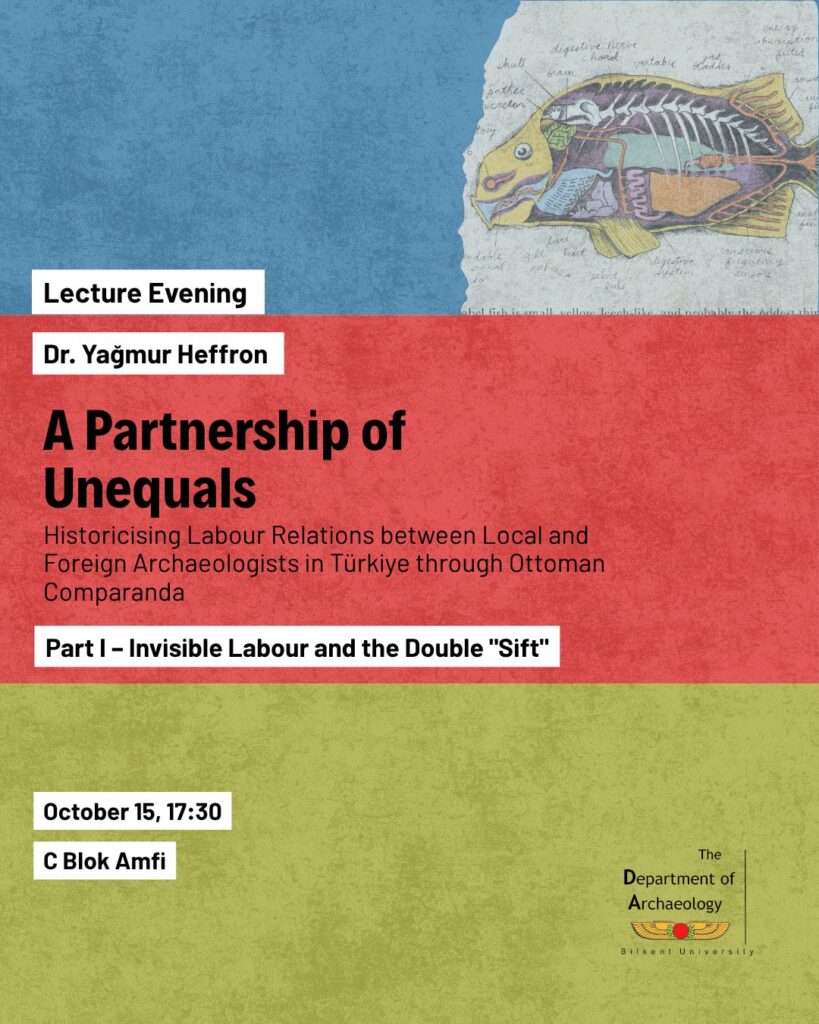
More info about the event can be found here
26th March
Crossing the Taurus in the 19th Century BCE
Time and venue: 17.30 C-Block Amphi
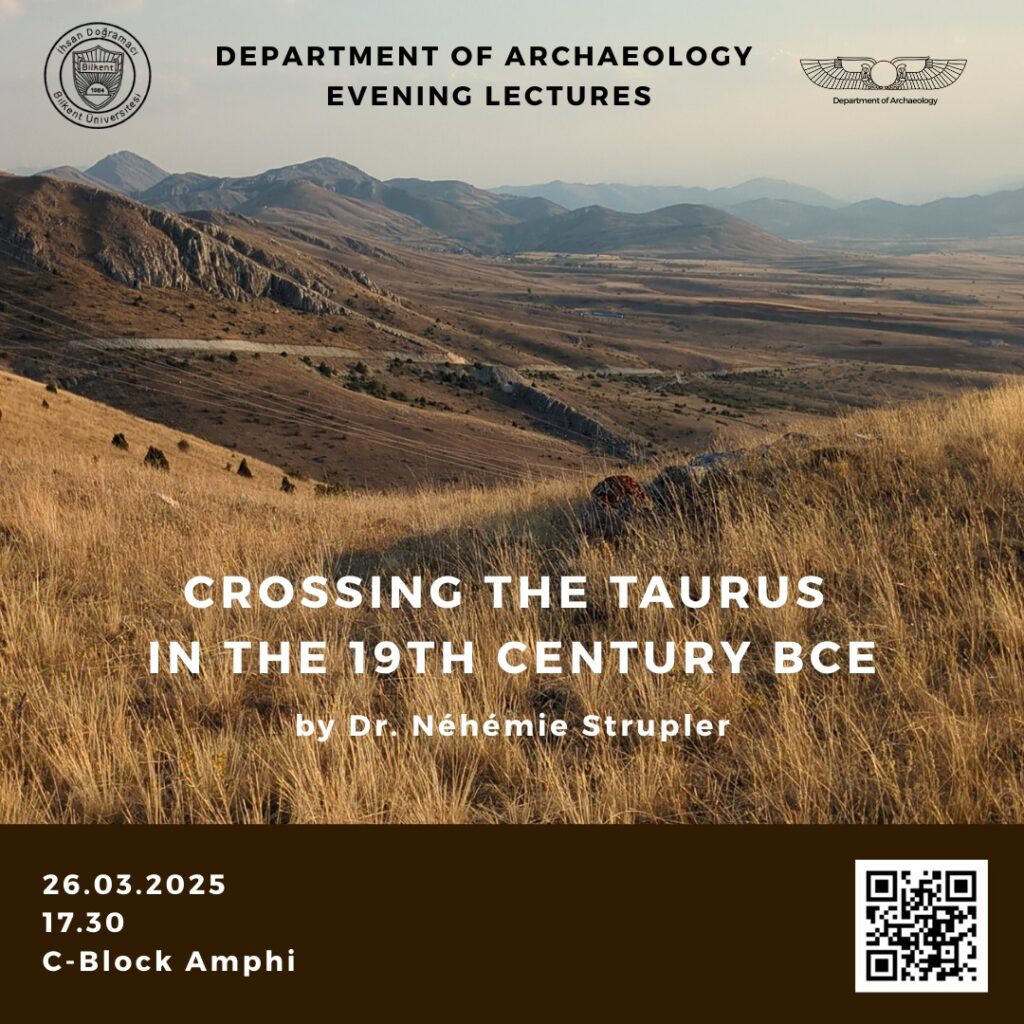
19th March
Life in transition: Shifts in settlement, urbanization, infrastructure and material culture in Hellenistic and Roman Imperial Asia Minor
Time and venue: 17.30 C-Block Amphi

13th March
Understanding the Prehistoric Art in the Search for Modular Orders
Time and venue: 17.30 FFB-22
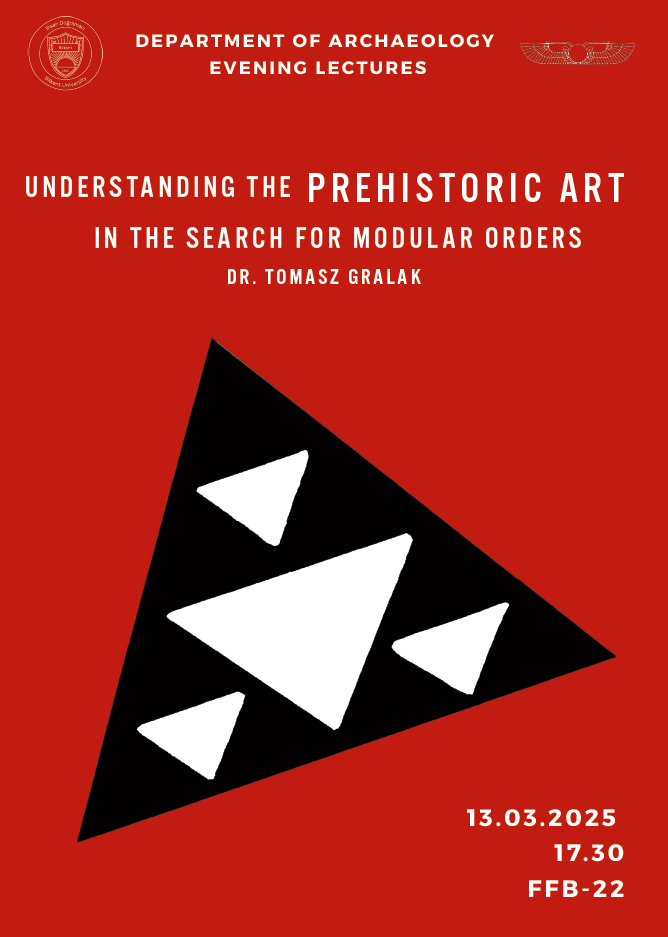
5th March
Department of Archaeology Evening Lecture: Bioarchaeology in Ancient Anatolia
Time and venue: 17.30 FFB-05
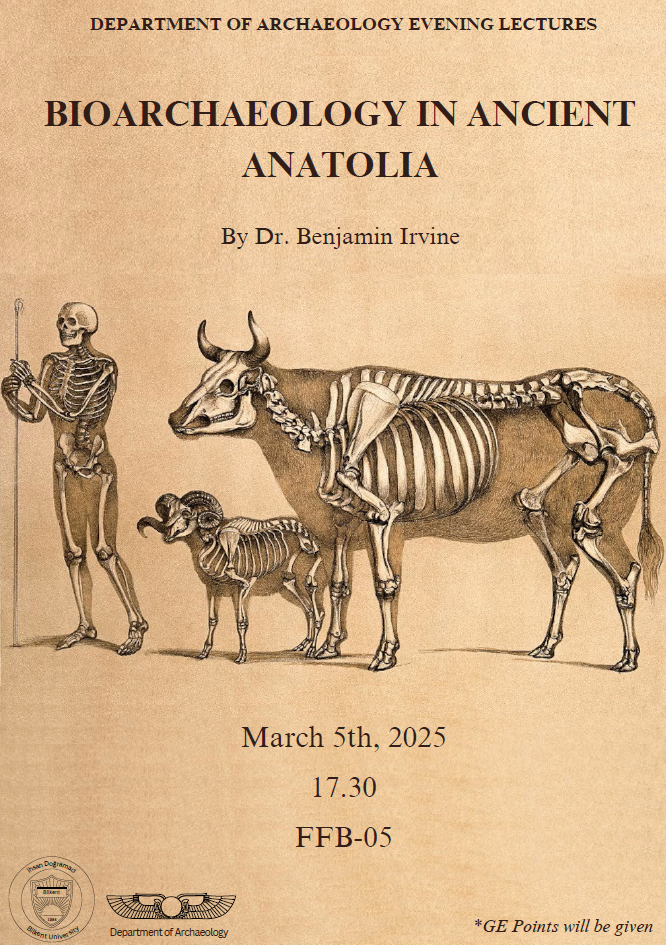
22nd – 23rd February
Önasya Arkeolojisi Toplantıları 2: İnsan Hareketliliği, Kolonizasyon ve Göç
Near Eastern Archaeology Meetings 2 Human Mobility, Colonisation and Migration
Venue: Fine Art Faculty FFB-05 Amfi
More info about the event can be found here
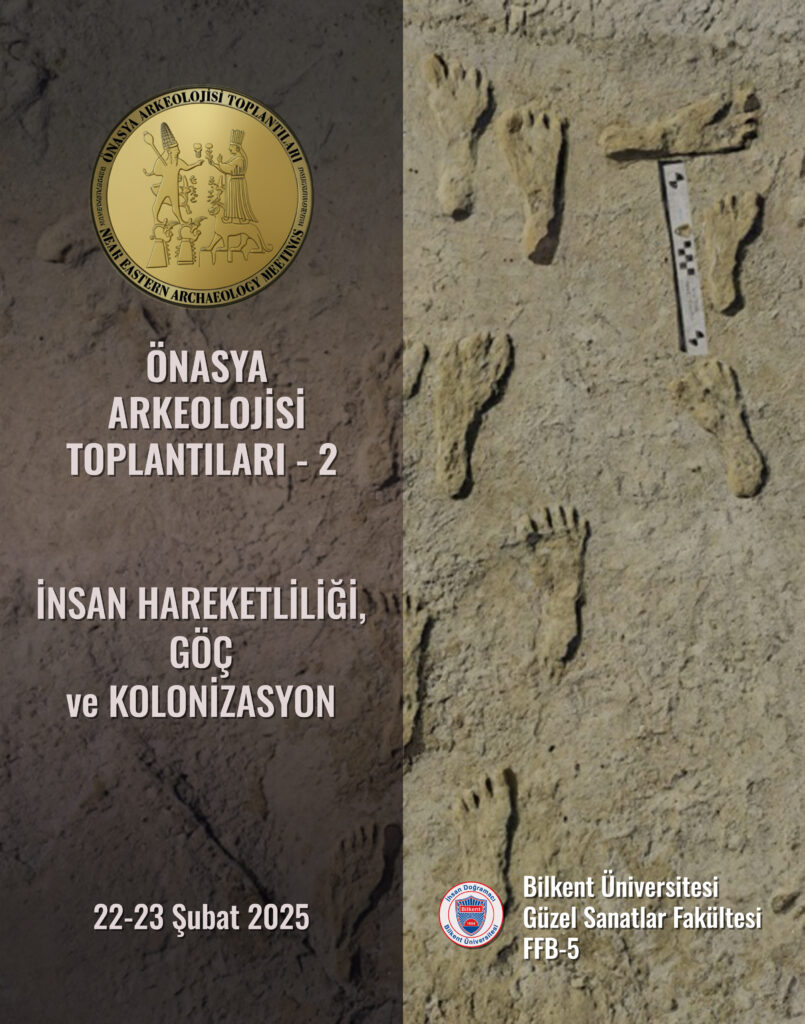
2024
19th December
A new look at an ancient city: an outline of the chronological and urban development of the Hittite capital Hattusa
Time and venue: 17.30 C Block Amphi
More info about the event can be found here
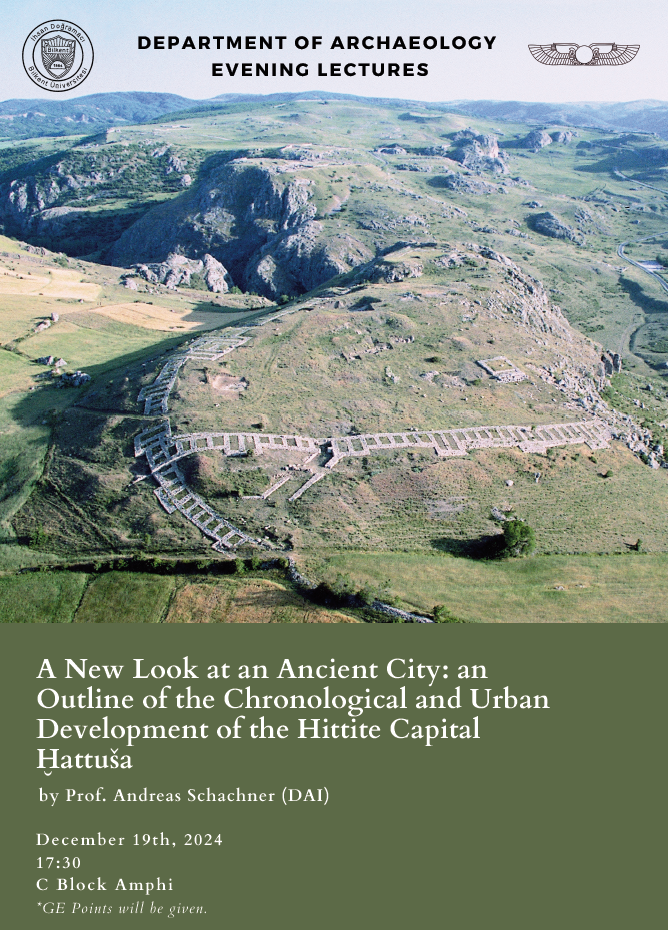
20th November
The ERC Project ‘Roman Empire of the 2000 Cities’
Time and Venue: 17.30 Bilkent A-130
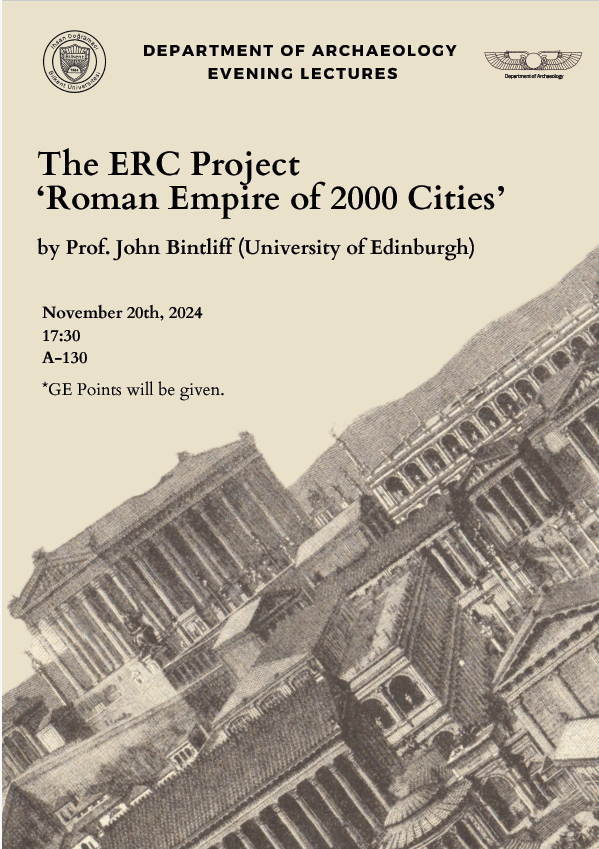
21st-22nd November
The 3rd Pisidia Symposium: The Interaction of Pisidia with the ‘Outside World’
More info about the event can be found here
Venue: Bilkent University Library, Art Room
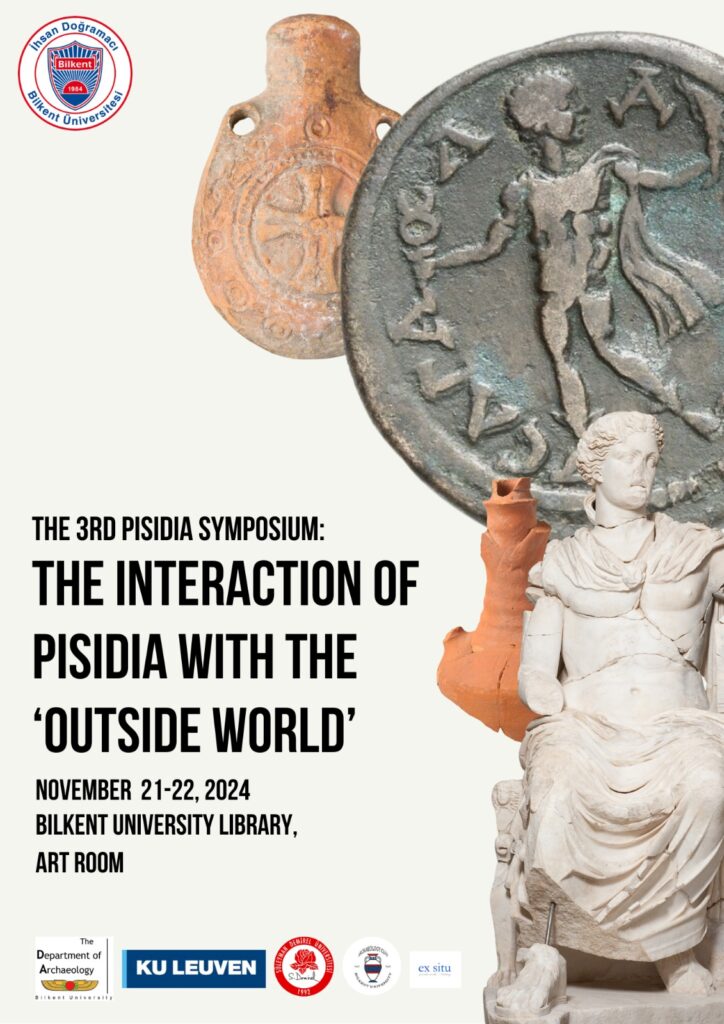
6th November
Chronicles of a Connected Frontier: the southern Anatolian Plateau between Phrygia and the Mediterranean in the first millennium BCE
More info about the event can be found here
Time and Venue: 17.30 H-232
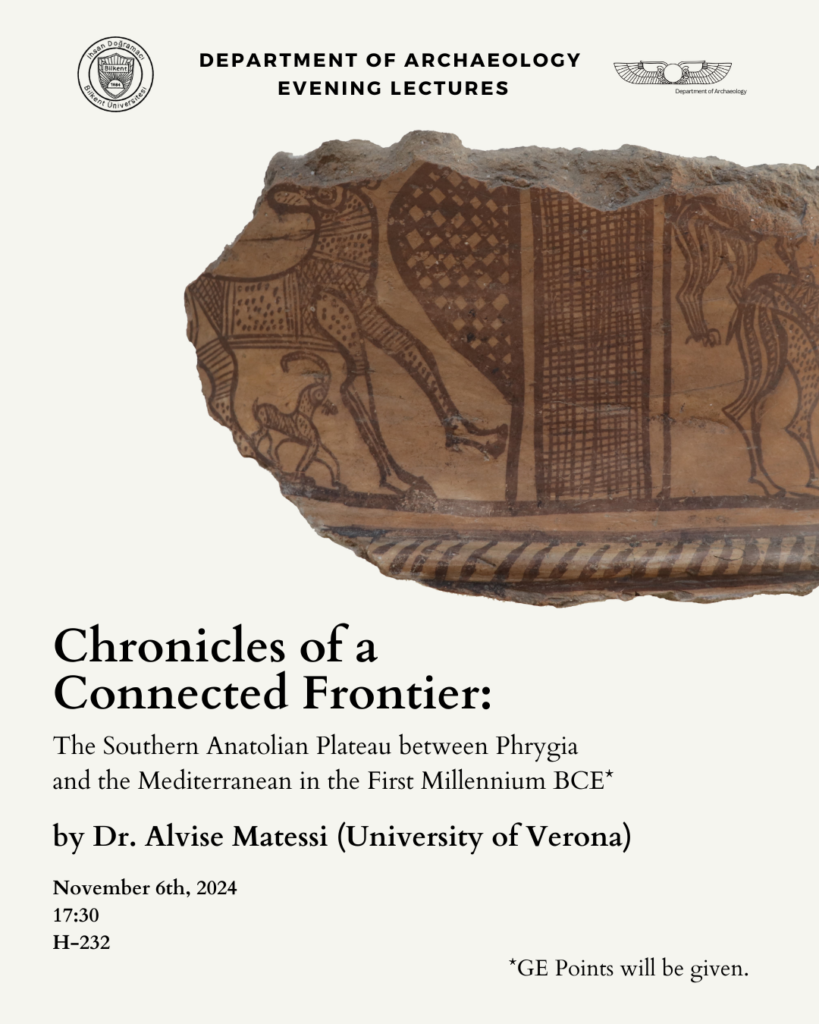
23rd October
Contested Cultural Heritage: ethics morality and the law in the context of museums & the Islamic art market
More info about the event can be found here
Time and Venue: 17.30 Bilkent University C Blok Amphitheatre
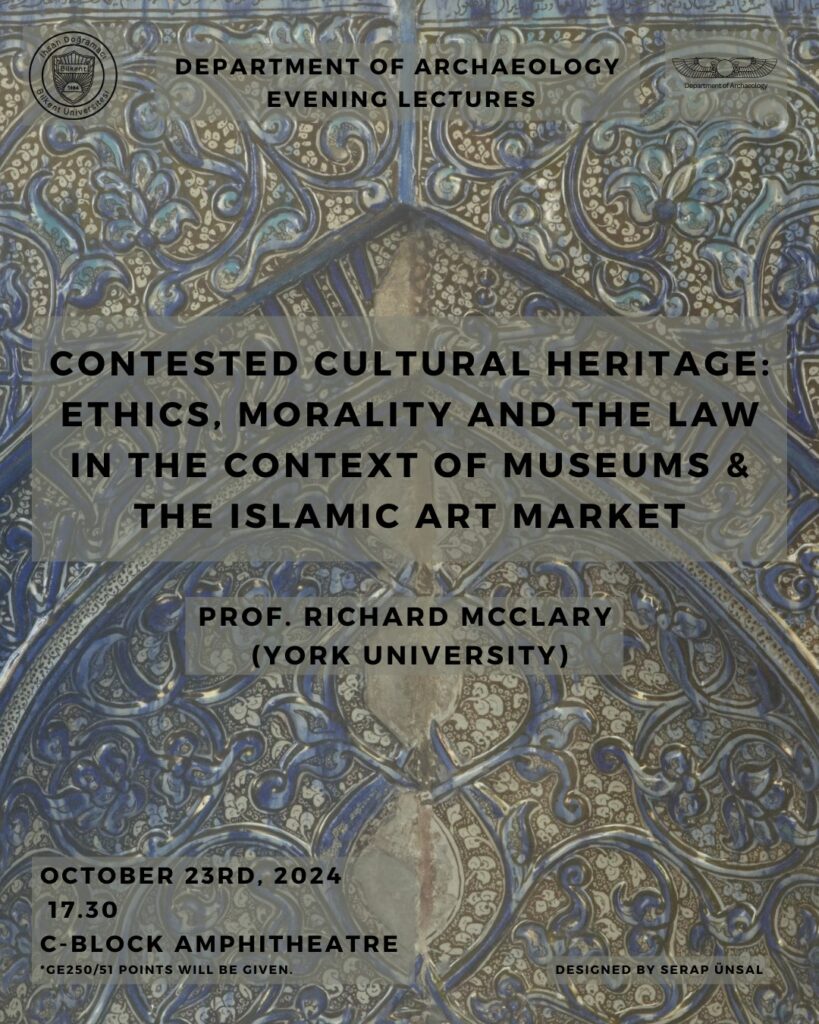
17th – 18th October
Public Archaeology: Dialogues, Communities and Social Challenges
More info about the conference can be found here
Venue: Bilkent University, Archaeology Department Room A130
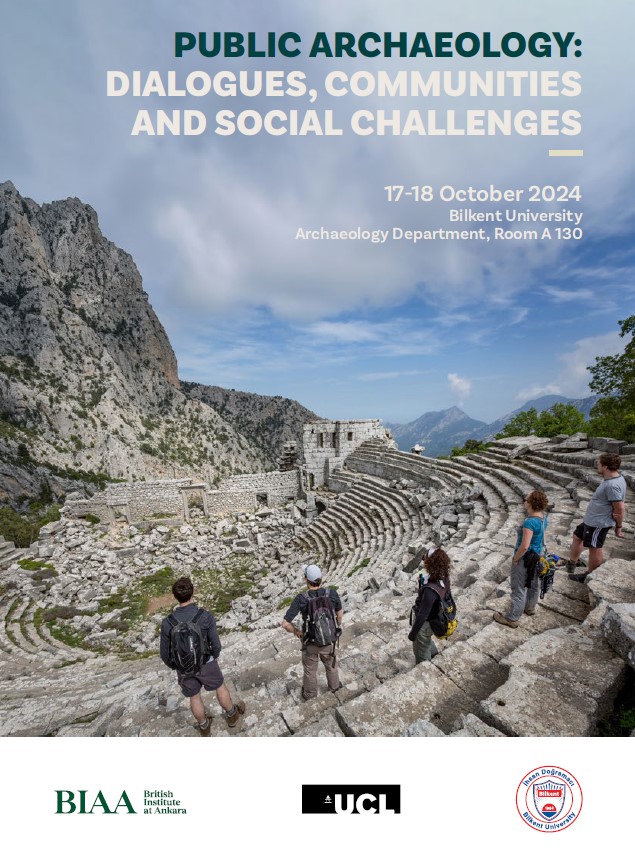
16th – 18th May
Connecting Stucco in the Mediterranean. (c. 300 BCE – c. 1200 CE) Methodological approaches and the State of Research
More infor about the conference can be found here
Venue: Bilkent University, C- Block Amphi
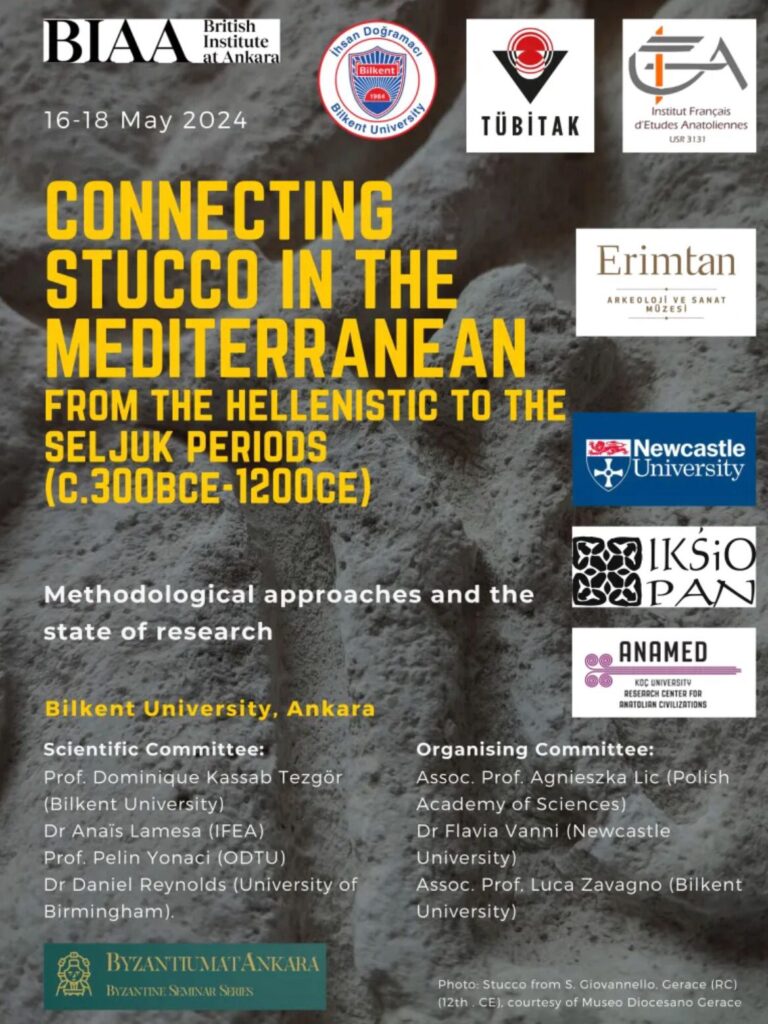
8th May
Evening Lecture by Prof. Jorge López Quiroga (Autonomous University of Madrid) and Dr. Natalia Figueiras Pimentel (Complutense University of Madrid): “Ancient and Early Medieval Rupestrian Architecture in the Iberian Peninsula. A Western Construction of Eastern Typology”
Time and location: 17:30, Room H-232 (Faculty of Humanities and Letters)
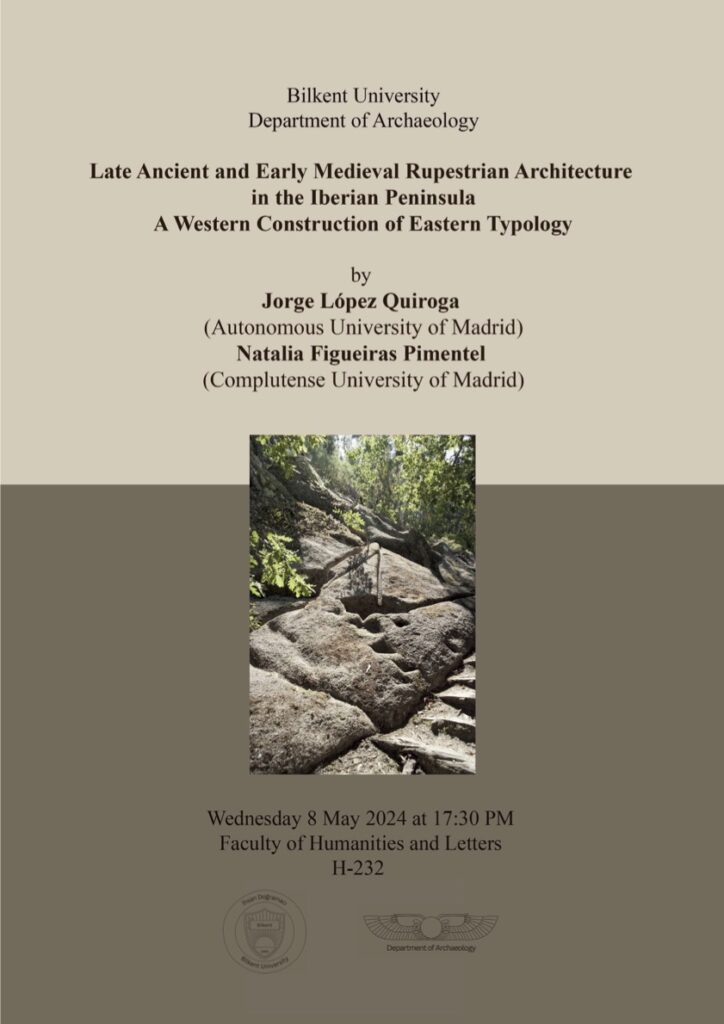
abstract
For the area corresponding to the Iberian Peninsula, architecture excavated in the rock has been present since Roman times, essentially in works of civil architecture, mining and its network of canals (well known, for example, in the northwest of the peninsula) that show a knowledge and technology in the process of excavating and working the rock. Later, throughout the Late Antiquity, rock architecture was also used for residential and cultural functions, particularly in the south of the Iberian Peninsula, with the arrival of monks and hermits from North Africa. During the Early Middle Ages, with the Islamic presence, this type of architecture was maintained and reused by small communities, for utilitarian and residential purposes, maintaining its use practically to the present day in the south and the Mediterranean area, where the presence of caves excavated in the rock is relatively abundant. With the development and consolidation of the Islamic presence, communities of hermit monks emigrated to the north, taking with them the technology and use of rupestrian architecture for funerary, cultural and residential uses. It is at this time when numerous churches, hermitages and monasteries were excavated in the rock with a notable oriental influence. From the 12th century onwards other types of constructions, expanding and changing the physiognomy of these cultural complexes, replace this rupestrian architecture. We can affirm that there exists in the Iberian Peninsula an important tradition of stonework and technology excavated in the rock, but with clear differences between the rupestrian architecture of the Roman period with respect to the late antique and early medieval ones. We therefore observe significant evidence in the Iberian Peninsula of an architecture that presents an apparently Western construction but at the same time with a precise Eastern typology, in which, maintaining local/Western tradition and influence, Eastern languages and architectural solutions are simultaneously introduced, first Byzantines and later Islamic.
short biography
Prof. Dr. Jorge López Quiroga is Full Professor of Medieval Archaeology at the Autonomous University of Madrid since 2022, having previously been Allocataire de Recherche (University of Paris IV), A.T.E.R. in Medieval History (University of La Rochelle), Research Assistant (University of Alcalá de Henares), Doctor in Medieval History (University of Paris-Sorbonne, Paris IV), Geography and History (University of Santiago de Compostela, USC) and European Doctor (USC). He is former Member of the Casa de Velázquez and former Fellow of the Alexander von Humboldt Foundation, among other various post-doctoral research grants. He has been a visiting professor at various European and American universities. He was Director of the Spanish Archaeological Mission in Conimbriga (Portugal) and Explorer Research Grant of the National Geographic Society. He is also Member of the National Society of Antiquaries of France, based at the Louvre Museum (Paris) and Associate Member of the Michel de Boüard Center (Centre for Ancient and Medieval Historical and Archaeological Research, CRAHAM-University of Caen-CNRS). He has directed, as principal investigator, twenty national and international scientific projects. He is the author of about twenty monographs, as author, editor and/or coordinator, as well as one hundred and fifty articles, book chapters and publications in Proceedings of National and International Scientific Congresses. He was also curator of the exhibition “In Tempore Sueborum. El tiempo de los Suevos en la Gallaecia (411-585)”, held between December 2017 and May 2018. For more than thirty years his research has focused on Late Antiquity and the Early Middle Ages in the Iberian Peninsula.
Natalia Figueiras Pimentel is Graduate in Art History, specialty History of Medieval Art (Santiago de Compostela University, 1995-1999). Teaching Certificate (University of Valencia, 1999-2000). Specialist in “Conservation and Restoration of Historical-Artistic Heritage” (Polytechnic University of Valencia, UPV, 2001-2003). She completed a doctoral program in Fine Arts, “Conservation and Restoration of Artistic Historical Heritage” (2001-2003). She has also a transdisciplinary training in relation to the documentation, study, and enhancement of cultural heritage: “Characterization of architectural materials and Stone Conservation-Restoration” (University of Zaragoza, 2004). Superior Technique in “Plastic Arts and Design in Artistic Photography” (EASD ‘Antonio Faílde’, 2008-2011), postgraduate training in Archaeometry and Applied Techniques (Polytechnic University of Valencia, 2001-2007; University of Murcia, 2020-2021 and University of Burgos, 2021-2023). She is currently doing her doctoral thesis in History of Medieval Art at the Complutense University of Madrid, International PhD Mention, with a thesis entitled: “Hermitism in the northwest of the Iberian Peninsula during the Middle Ages from the St Pedro de Rocas rupestrian complex (Ribeira Sacra, Galicia, Spain) as a paradigm: a transdisciplinary scientific study applied to the History of Art”.
26th April
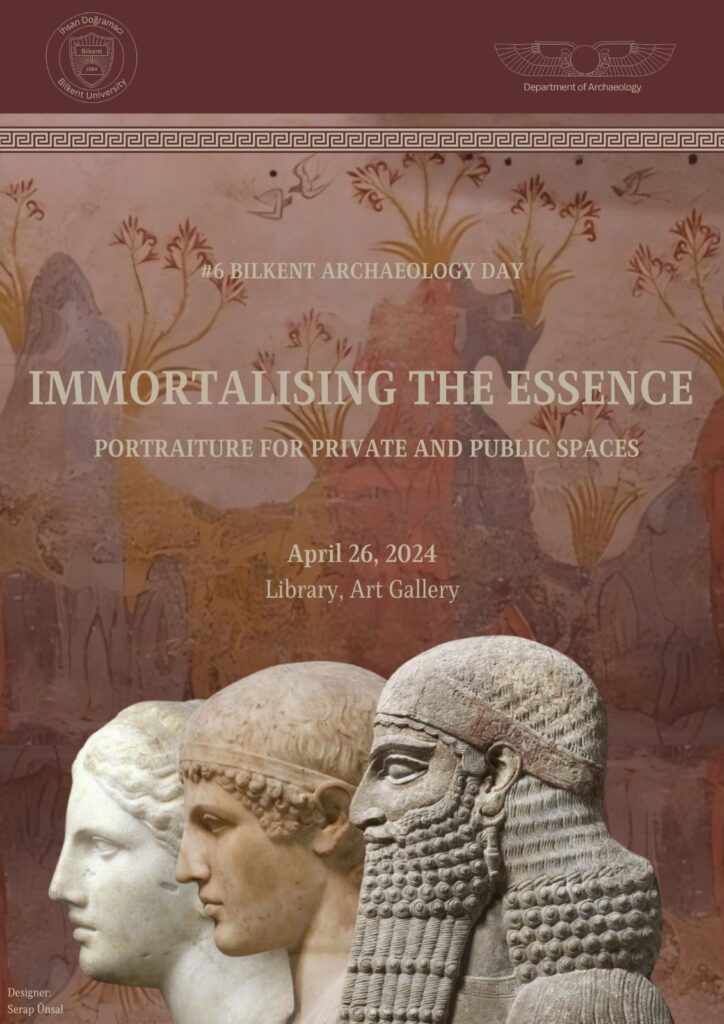
The representation of the face with its features and its expressions has always reflected the choice of the artists, or those who commission the piece, and/or its subject, according tointention and function of the artwork, and the beliefs and the context of the time and the culture when it was fashioned.
Some such portraits were destined for the darkness of the tomb, as were the plastered and painted skulls of the Neolithic, the golden masks of Mycenaean nobles, and the portrayals of the deceased on Fayum mummy portraits. Others were for the bright light of public and private spaces, such as the smiling kouroi and kore portraits of Archaic period in Greece, or infused with ideal beauty for Greek temples, or the sober grandeur and dignity of the Roman emperors.
Yet all were intended to immortalise the essence of the person they portrayed, the focus of the 6th annual Bilkent Archaeology Day. In this celebration of portraiture, we shall explore this prominent aspect of the distant and near, past, the impulse to capture the soul and character of a person through portraiture, whether idealised or realistic, whether inspired by ritual or political factors. To do so we will examine and the motives and intentions of the artists, and the role of social, religious, and political factors in the society behind the creation of the artwork, and so better define the role of portraiture in its original context.
The detailed program of the Bilkent Archaeology Day 2024 can be found here.
27th March
Evening Lecture by Dr. Julia Koch (Institute of Classical Studies, University of Giessen): “Phrygians at the Black Sea? Exploring Ritual Landscapes in Northern Anatolia”
Time and Location: 17:30, Room H-232 (Faculty of Humanities and Letters)
GE points will be given

Abstract
The Kingdom of Phrygia is traditionally located in the western Anatolian Plateau centering on the capital at Gordion on the Upper Sangarios River. Recent scholarship, however, has reconstructed the territorial expansion of the Phrygian Kingdom on a large scale both to the east and to the northeast of Gordion for political control over the region of the Halys River bend during the later 8th/7th century B.C. The Devrez Valley north of Çankırı at the foot of the Ilgaz Mountains is seen to have marked the northern limits of the Phrygian state. In this lecture we cross the Ilgaz Mountains towards the southern Black Sea to survey the religious landscape inventories of Iron Age northern Anatolia influenced by Phrygian culture: rock-cut facades and idols, stepped altars carved from the living rock, cult statues and niches, and so-called house shrines sculptured in miniature. At the sanctuary of Phrygian Zeus at Tios two sherds incised with Paleo-Phrygian graffiti were found next to East Greek and Attic pottery near an Archaic temple, while in Tios’ hinterland Phrygian grave goods were deposited in a tumulus. Votive offerings of Attic drinking vessels dedicated to Kybebos and terracotta figurines of the goddess ritually deposited in a sacrificial pit at the Greek seaport of Amisos shed further light on the significance of sanctuaries as stage for the maintenance of local cult tradition and intercultural exchange. By presenting new and less recent finds of sacr(aliz)ed places this talk offers fresh insights into Iron Age northern Anatolia abundant with astonishing ritual landscapes and it is hoped to encourage further discussion on colonial encounters of diverse migrant communities – both Greek and Phrygian – settling along the southern Black Sea coast.
Short Biography
Julia M. Koch studied Classical and Proto- and Prehistoric Archaeology at the Universities of Heidelberg, Munich, and Athens before she became lecturer at the Universities of Bamberg and Giessen. She acted as director of the Pompeiopolis field school in Türkiye (2014-2016) and conducted field schools at the UNESCO World Heritage Sites of the Raetian and the Upper German Limes as well as surveyed archaeological sites in the Caucasus Mountains, Azerbaijan, Tajikistan, Peru, and Türkiye through geophysical prospection. In 2018 she was awarded the dissertation prize of the Faculty for the Study of Culture at LMU Munich for her Ph.D. Dissertation on Funerary Monuments from the City of Pompeiopolis in Paphlagonia – Tradition and Local Identity in Sepulchral Art of Roman Northern Anatolia. In 2022/23 she was a visiting research fellow at the University of Edinburgh and King’s College in London and, most recently, a guest lecturer at Boğaziçi University in Istanbul. Currently, she is a member of the Tios Excavation on the Black Sea coast and the 7th Research Network on Socio-Ecological Approaches to the History and Archaeology of Anatolia organized by the Istanbul Department of the German Archaeological Institute, Koç University’s Research Center for Anatolian Civilizations, and Princeton University’s Climate Change and History Research Initiative.
21st March
Evening Lecture by Dr. Emma Baysal (Ankara University): “Small things, big stories: re-writing prehistory from new perspectives”
Time and Location: 17:30, Room H-232
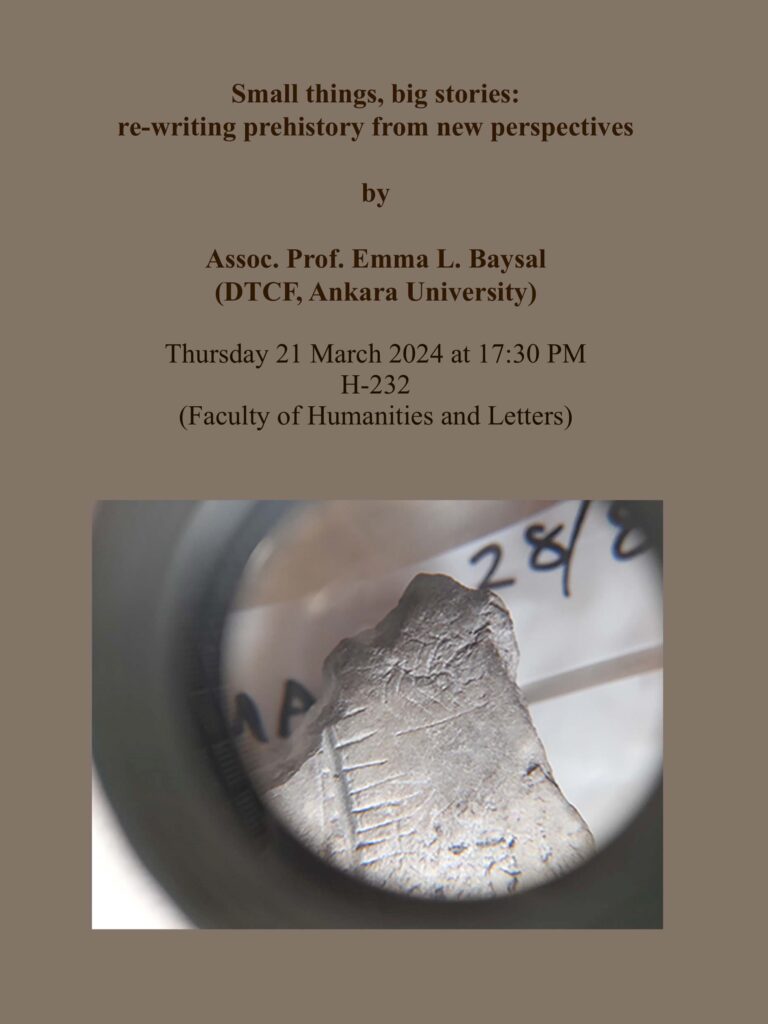
Abstract
Prehistory is generally characterised in terms of grand narratives of human development – technology, symbolism, domestication and sedentary life among others. However, the human experience is often lost in the vast scales of time and space that are being discussed in this macro picture of important changes. This lecture considers how archaeologists can approach the people of prehistory by using their material culture to paint a new picture of life in the past. Both personal and group identities can be understood through the artefacts that were closely associated with the human body, especially ornaments. Here, prehistoric identity is characterised using big data and artefact biographies to structure new understandings of what age, sex, community and social roles might have meant to people in the earliest settled communities of the Neolithic in Türkiye.
Short Biography
Emma L Baysal is an archaeologist who researches the prehistoric archaeology of Türkiye with a particular focus on past identities and the material culture of ornamentation. She received her PhD from the University of Liverpool in 2010 and has since become Associate Professor of Prehistory at Ankara University. She is a National Geographic Explorer, currently working on a project called ‘Small things, big stories’ which aims to document prehistoric identities at the dawn of settled life. She has active field research at many sites across Türkiye ranging from the Epipalaeolithic to the Bronze Age. She is also active in education, using her research to inform the creation of learning resources for the promotion of archaeology and in international development at university level for which she was awarded a Newton Advanced Fellowship.
13th March
Evening Lecture by Dr. Lee Clare (Deutsches Archäologisches Institut, Istanbul): “Who built Göbekli Tepe? Of Inspired individuals and charismatic leaders (including a summary of recent fieldwork)”
Time and Location: 17:30, Room FBB 22
Have you missed the lecture? A recording of the lecture can be found here.
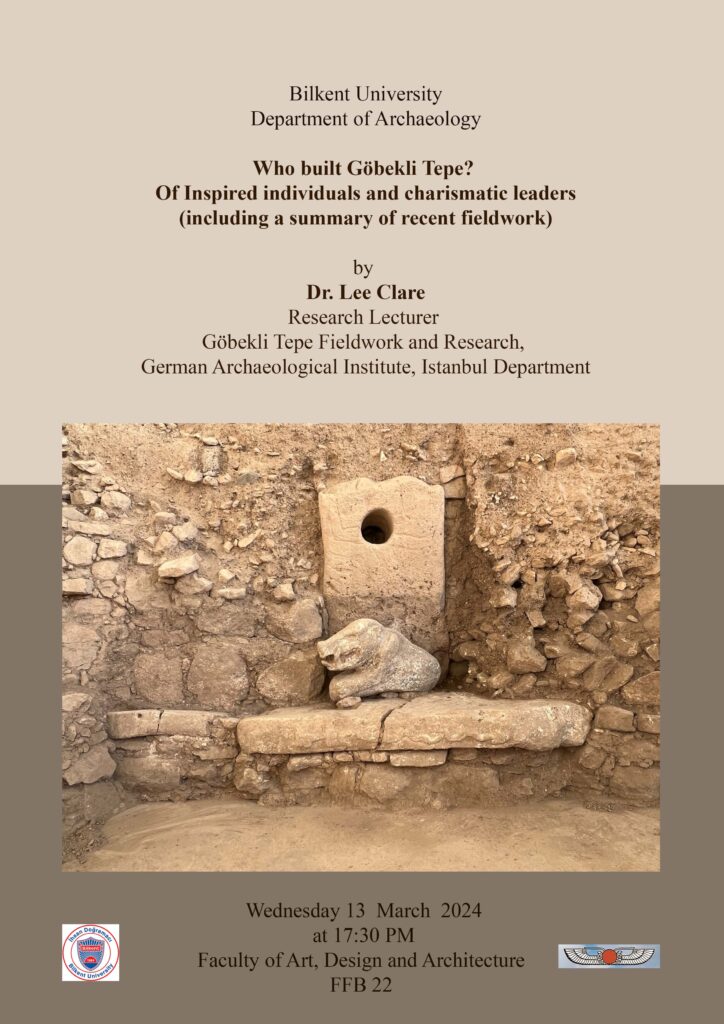
Abstract
In this lecture, we return to the much debated question surrounding the existence of an invisible (?) social elite at Göbekli Tepe. If such an elite did exist, who were they, what was the source of their influence, and why were the special buildings so crucial to their success? In this context, the new discoveries from recent fieldwork (2021-2023) will be presented.
Short Biography
Dr. Lee Clare is responsible for the coordination of the Göbekli Tepe Project. He completed his master’s degree at the University of Cologne in 2005, majoring in prehistoric archaeology. Following the completion of his PhD in 2013, which focused Early Holocene climate-culture interactions in the Eastern Mediterranean, he joined the Orient Department of the DAI as a post-doctoral fellow. In 2015 he took on the position of research coordinator of the DFG long-term project at Göbekli Tepe, and in 2019 moved to the DAI’s Istanbul Department where he is now acting consultant for prehistoric archaeology. His areas of academic interest include Neolithisation and Neolithic dispersal processes, Early-Middle Holocene absolute chronologies, culture-climate interaction, prehistoric conflict and cognitive evolution.
7th February
Evening Lecture by Prof. Jeroen Poblome (KU Leuven, Belgium): It’s about time! Reflections on the role of chronology in archaeology
Time and Location: 17:30, Room H-232
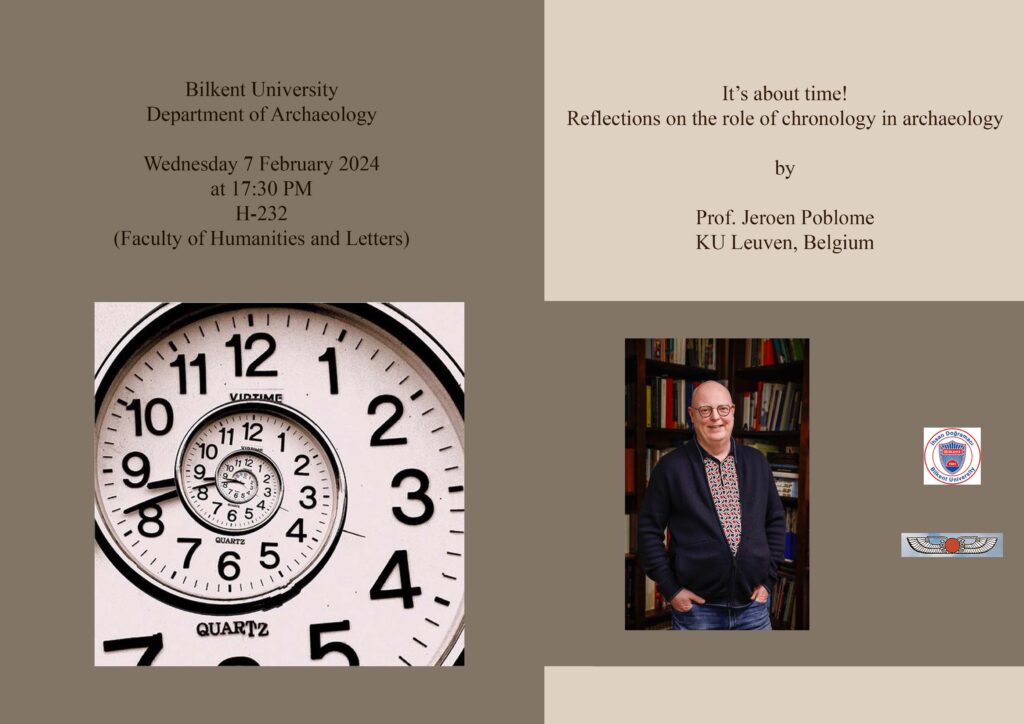
Abstract
In methods, practices and concepts, the discipline of Archaeology remains in full motion. Ever newer computational modelling techniques are being unleased. Ever more detailed methods of spatial analysis are being employed. While most of these developments are excellent, Archaeology starts running some risk. As space and time have always been the most important dimensions of analysis for the discipline, the field of space is doing fine, but that of time not. From revisiting a range of vexed issues in archaeological chronology, the lecture wishes to raise awareness to start considering the role of chronology in archaeology with renewed interest.
Short Biography
Prof. Jeroen Poblome teaches Roman archaeology, archaeological chronology and the study of past economies at KU Leuven, Belgium. He has been involved in fieldwork projects in Belgium, Greece and Turkey. His research interest include ancient pottery, crafts and trade, the people in urban studies and the role of complexity and socio-ecological approaches in archaeology.
2023
8 – 10 December:
Conference: Contextualizing the Neolithic: Regional Approaches to Sedentism and Domestication in the Konya Plain
Here more info about Program and Abstracts and how to register to the event.
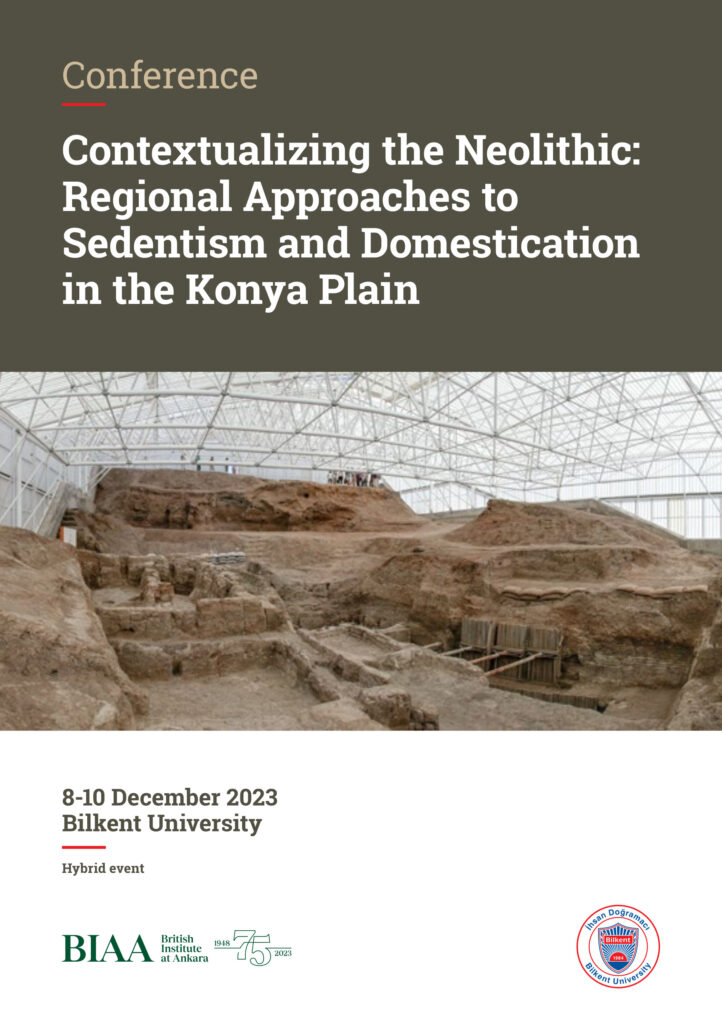
30th November – 1st December:
10th IFEA Archaeological Meetings
Black Sea crossings. Maritime networks from Hellenistic to Byzantines times
Event organized by the French Institute of Anatolian Students (IFEA), Bilkent University, SRII, Louvre Museum, the Institut GABAM (Koç University), the Institute KUDAR (Koç University) and the support of ANAMED (Koç University), the foundation IPLI and the Laboratory for Studies on Rhetorics.
Venue: ANAMED Auditorium, İstiklal Caddesi No: 181 Merkez Han 34433 Beyoğlu/İstanbul
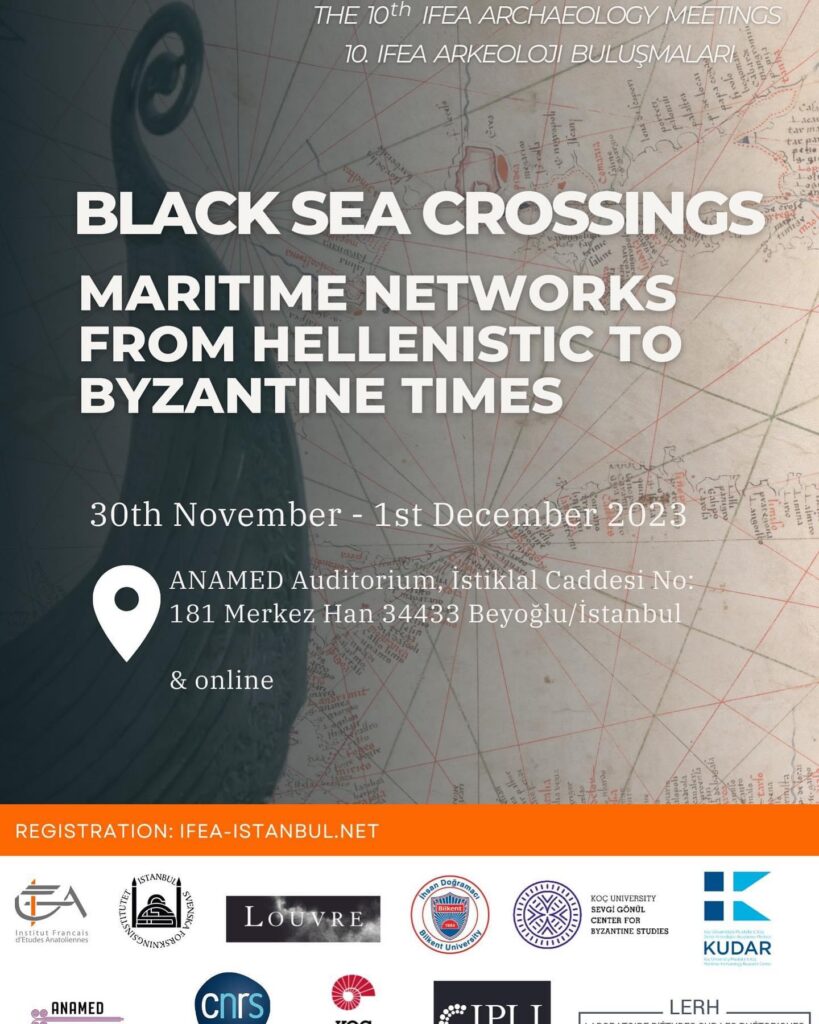
23rd – 24th November:
Pigments, Colors and Ideas
International Symposium and Exhibitions
For info about the program of the symposium visit the website

13th November:
Evening Lecture by Hugh Elton (Professor, Trent University, Canada): Alahan: How a Roman City in Isauria Related to its Villages
Time and Location: 17:30, C-Block Amphi (Faculty of Economics) or Zoom Registration: bilkentarkeo@gmail.com

1st November:
Evening Lecture by Felix Pirson (Deutsches Archäologisches Institut, Istanbul): Meter-Kybele in the Pergamon Micro-region: Formation, Functions, and Transformations.
Hybrid: C-Block Amphi (Faculty of Economics) or Zoom Registration: bilkentarkeo@gmail.com

4 – 6 May:
Conference: Integrated Approaches to the Political Geography of Southern Anatolia, 1650-550 BCE
Hybrid: Room A 130 (Faculty of Humanities, Department of Archaeology) or Zoom. Registration: https://pgsa.hittites.org/
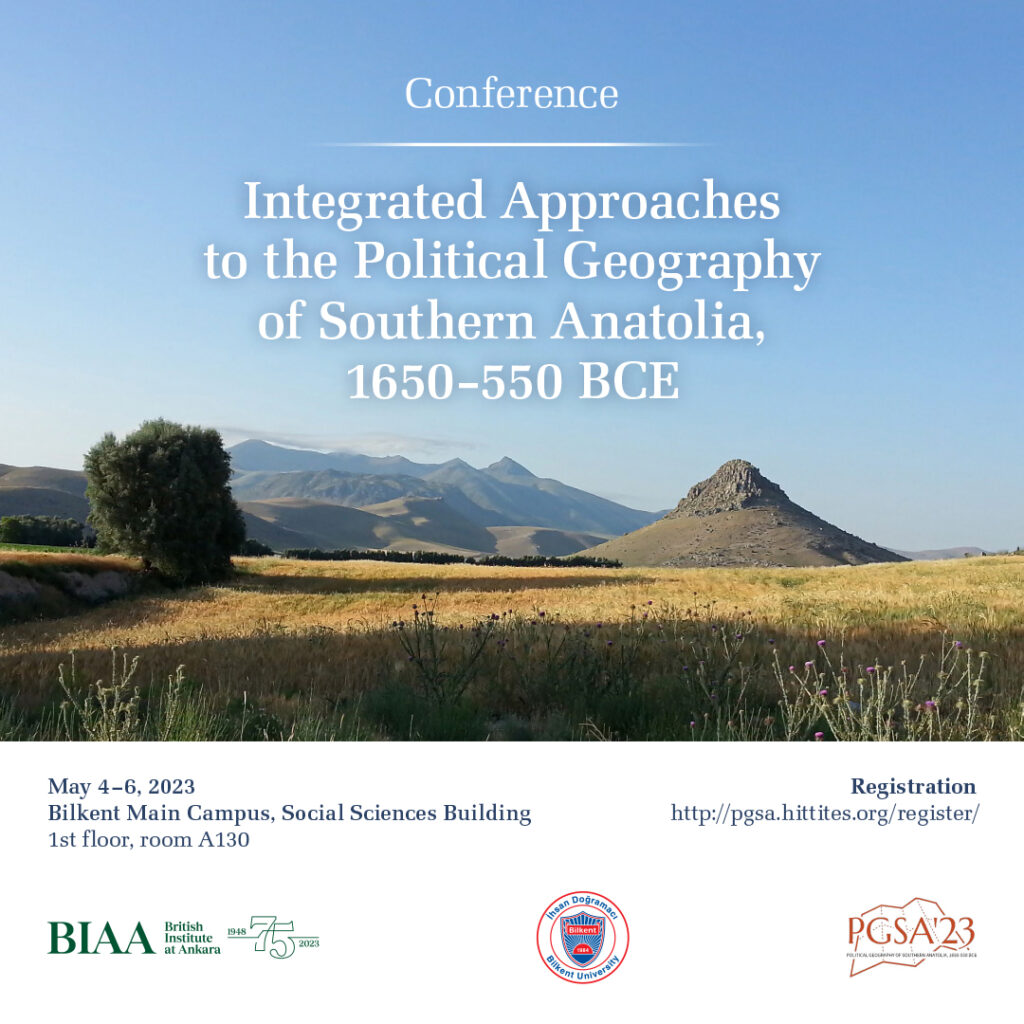
26th April:
Evening Lecture by Peter Talloen (Assistant professor at İsparta University, Director of the Sagalassos Excavations): Approaching identity through space and material culture: The case study of the Rock Sanctuary at Sagalassos (SW Turkey).
Time and Location: 17:30, C-Block Amphi

19th April:
Evening Lecture by Barbora Weissova (Assistant professor at the Institute of Archaeological Studies Ruhr-University Bochum, Germany): Archaeological Archives in the Digital Era. Attika 2.0
Time and Location: 17:30, Room H-232
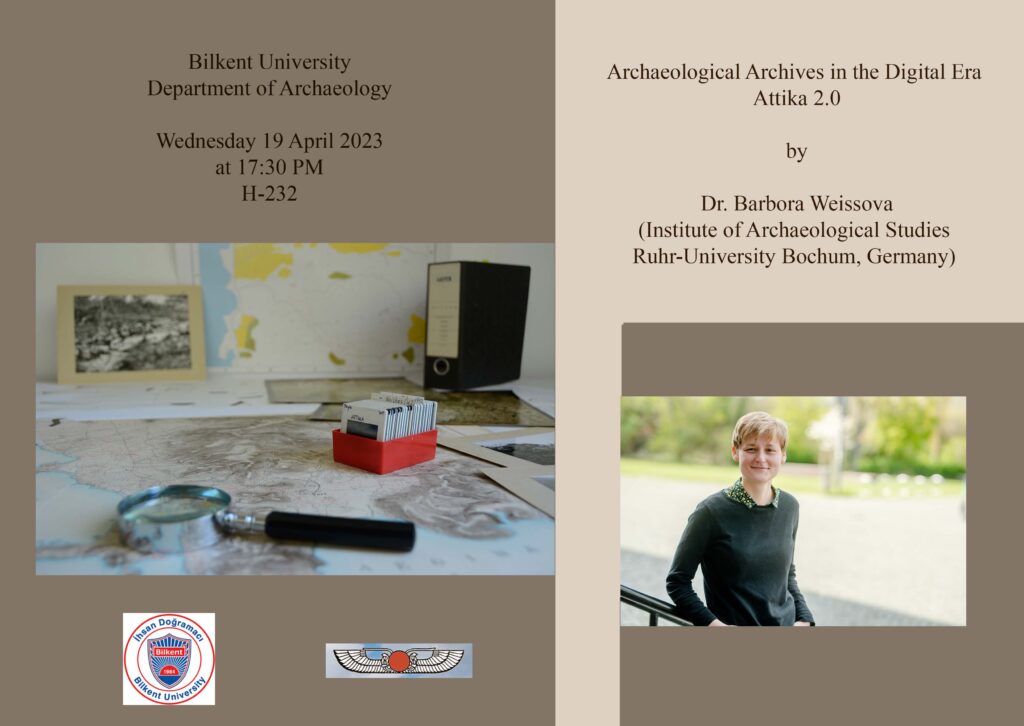
31st March:
Bilkent Archaeology Day: « Grounding Selves: Archaeological Approaches to Past»
Hybrid Colloquium, C-Block Amphi or registration required: bilkentarkeo@gmail.com
Speakers: M. Kadıoğlu, İ. Gerçek, L. Zavagno and I. Jevtic.

21st March
Evening Lecture by Prof. Bert Smith (Aphrodidias excavations, director), Case of the Past: Buildings and statues at Aphrodisias in later antiquity, AD 200-600.
Time and Location: 17:30, C-Block Amphi

2022
14th December
Zoom Lecture by Prof. James Osborne (University of Chicago): Uncooperative Nation-States: The Syro-Anatolian Culture Complex.
Registration: bilkentarkeo@gmail.com
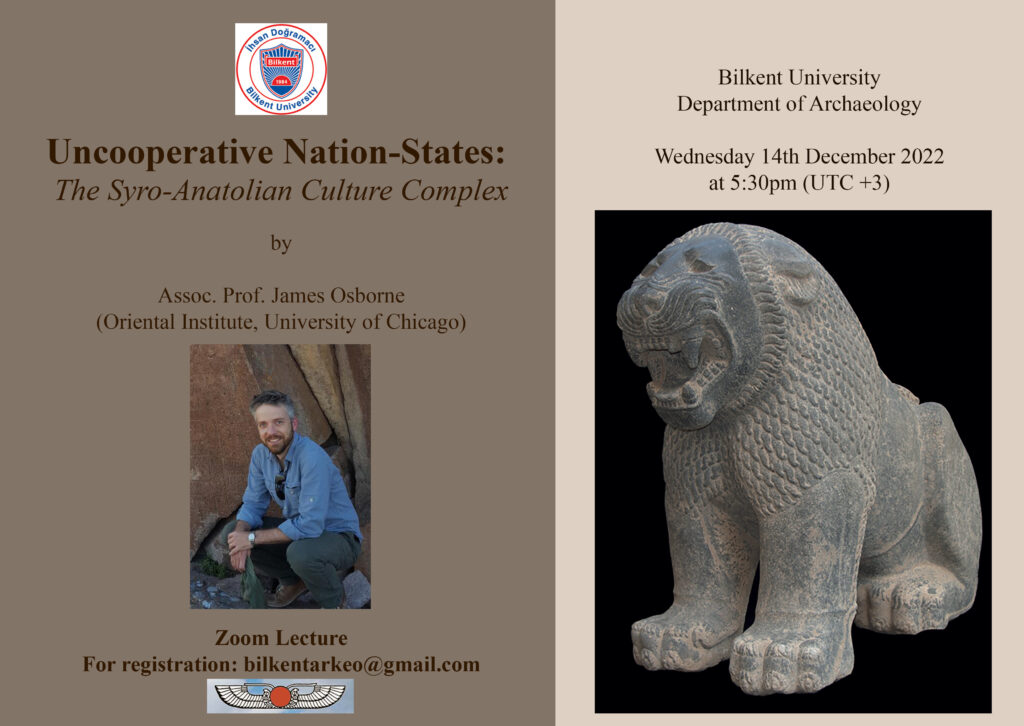
23rd November
Lecture by Samuel Andrew Hardy (Heritage Management Organization): Treasure-Hunters and Organized Criminals: Looters and Traffickers of Antiquities in Turkey.
The lecture will be followed by a Panel with Zeynep Boz (Ministry of Culture and Tourism), Gürcan Türkoğlu (Ambassador, R.) and Işılay Gürsu (BIAA) as a moderator.
Time and Location: 17:30, C Blok Auditorium
